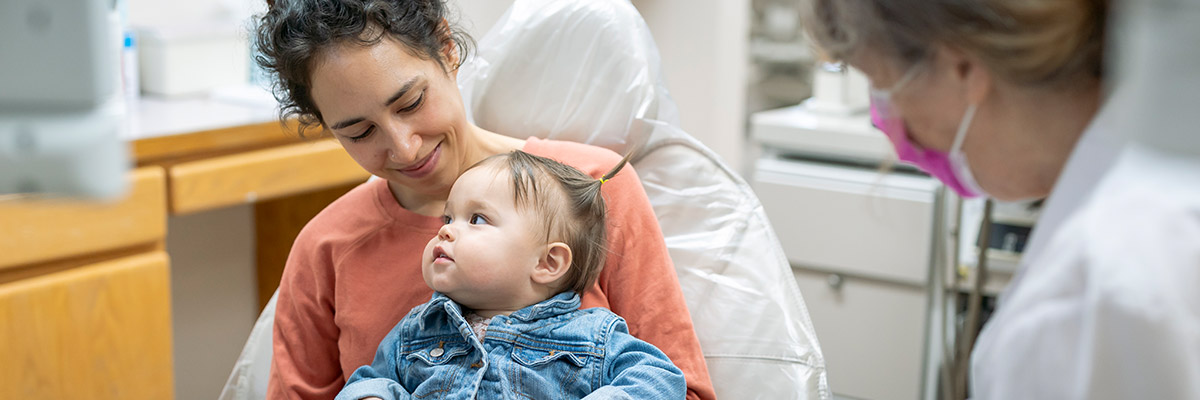
Article at a Glance
As a new parent, you want to ensure your baby is healthy and happy. One crucial aspect of your baby’s health is their dental health. But, since babies arrive with many needs and without a full set of teeth, dental care can be an easy step to overlook.
The American Academy of Pediatric Dentistry and the American Academy of Pediatrics both recommend that children see a dentist by their first birthday, or within six months after their first tooth appears. This may seem early, but it’s important to establish good dental habits from a young age. A pediatric dentist can also check for any potential dental problems and provide guidance on how to care for your baby’s teeth.
The most important part is that you see a dentist. But, there are several benefits to seeing a pediatric dentist instead of a general dentist for your child’s dental care.
Pediatric dentists receive two to three years of additional training after dental school that focuses on the unique dental needs of infants, children, and adolescents. They are specifically trained to work with children, including those with special needs, to provide a comfortable and positive dental experience.
Pediatric dental offices are designed to be child-friendly, with bright colors, toys, and games in the waiting room to help children feel comfortable and relaxed. The dental chairs and equipment are also designed with children in mind, making the dental experience less intimidating.
Pediatric dentists focus on preventive care, such as fluoride treatments and dental sealants, to help children avoid tooth decay and other oral health problems. They also advise on good oral hygiene practices and diet choices to help children develop healthy habits for life.
Pediatric dentists are trained to detect and treat dental problems early, before they become more serious and require more extensive treatment. They can also provide early intervention for orthodontic issues, helping to ensure proper dental development and preventing more significant problems later on.
Pediatric dentists work closely with parents to educate them about their child’s oral health and provide guidance on proper dental care at home. They can also support parents with concerns about their child’s dental development or their behavior during dental appointments.
Regular dental check-ups are essential for everyone, regardless of age. For babies, seeing a dentist early can help prevent future dental problems. Those little baby teeth play an important role in developing adult teeth. They help your baby chew and speak and also hold the space for adult teeth to grow in properly. If baby teeth are lost too early due to decay or injury, it can cause problems with the development of adult teeth.
Seeing a dentist early can also help establish good dental habits. A pediatric dentist can provide guidance on how to clean your baby’s teeth and gums and provide information on proper nutrition and fluoride usage. By establishing good habits early on, you can help ensure your baby’s dental health as they grow older.
During your baby’s first dental visit, the dentist will likely do a quick exam to check for any potential issues. They may also guide you on brushing and flossing techniques appropriate for your child’s stage of dental development. Finally, the dentist will likely clean your baby’s teeth and offer fluoride treatment.
If you’re visiting an office specializing in kids, chances are good that your child will leave with a smile, a prize, and a positive memory of the visit.
In conclusion, your baby probably needs to see a dentist earlier than you might have thought. If you prefer to see a generalist, it’s not the end of the world. But if you or your child have complex dental issues or anxiety around dental visits, starting with a children’s specialist may be the smart move.
Be sure to check out these dental articles as well:
Taking Care of our Children’s Teeth
What should I do if my child has a dental injury?